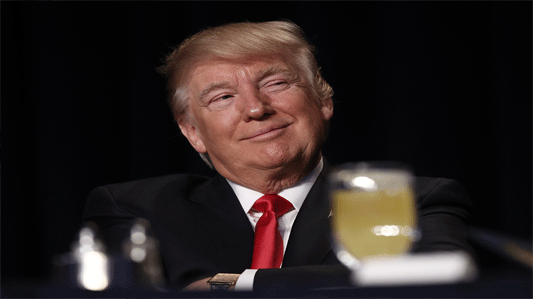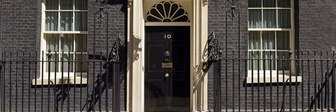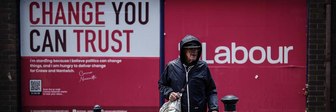A week, notoriously, is a long time in politics; two weeks of President Trump evidently feels to many like an eternity, and an eternity spent in one of Dante’s circles of Hell.
Not in living memory has a new American president aroused such anger and protest, not just in his own backyard but also around the world. Is this response, and the alarm for the future it clearly expresses, justified or an over-reaction? What do those who haven’t protested think? And has Britain’s handling of the new president been foolhardy or judicious?
Donald Trump has surprised everyone at every stage of his astonishing journey to the White House. He surprised by running in the first place. He surprised by winning the Republican Party nomination when he was barely even a member of the party. And he confounded all expectations by trouncing Hillary Clinton who, it had been predicted, would beat him in a landslide. At each stage, the grey beards of mainstream political commentary opined, he would reach the next one only if he shed his persona as a brash property tycoon and vulgarian reality TV star and became more like an establishment politician, one who could appeal to the ‘centre’ (whatever that might be).
But he didn’t. As my friend and colleague Jon Sopel, the BBC’s North America editor, put it: we have now seen Donald Trump in three guises, the candidate, the president-elect and the president. And they are all exactly the same person.
It was clear from the moment he took the oath of office that he intended to govern as he had campaigned: from the hip and in his own way. His Inaugural Speech defied the commentators yet again: it was not the usual healing, unity-seeking speech his predecessors had preferred, almost to a man. It was confrontational, divisive and much the same as the many he had delivered on the stump. It was rawly populist and it repeated, in an almost threatening tone, his mantra that he was going to put ‘America first’.
When he denied the demonstrable fact that fewer members of the public had attended his inauguration than had massed in the snow for Barack Obama’s, eight years before, it served merely to confirm the view of many that this was
a man simply unfit to hold the office. To them he seemed a classic case of someone suffering from a narcissistic personality disorder with paranoia to boot. Such a person sees the world only as a reflection of himself and when the world has the effrontery not to conform to that view, the result is a paranoid outburst that ‘they’ (in this case the mainstream media) are out to get him. For the commander-in-chief of the most powerful nation on earth to be such a person is, to say the least, troubling.
When Mr Trump appointed as his chief strategist, Steve Bannon, the former executive chairman of Breitbart News, the fears of those appalled by the accession of President Trump were only compounded. Under him, the online ‘alt right’ news channel had (in their view) an exceedingly loose commitment to the concept of truth and was a peddler of ‘fake news’. Mr Bannon believes in confrontational politics to bring about change and seems ready to take casualties on the chin. He is also on record as predicting a war between America and China within ten years. That he has most unusually been appointed to the Principals Committee of the National Security Council over the heads of the usual top brass has sent shudders down many spines.
The new president’s reassertion of his belief in the efficacy of torture and his readiness to fall out even with allies seemed to confirm the influence of the confrontational Mr Bannon. The Mexican president abruptly cancelled a planned visit to Washington when Mr Trump repeated his determination that Mexico would be forced to pay for the wall between the two countries that Mexico does not even want. And Mr Trump is reported to have slammed the phone down (though this has been denied) on someone he might have regarded as an ally in the so-called ‘Anglosphere’, the Australian Prime Minister, Malcolm Turnbull. The Australians used conventional diplomatic language to describe the incident, talking of a ’very frank and forthright’ conversation’ that had been ‘shorter than expected’; President Trump simply dismissed it as ‘the worst by far’ of the conversations he had had with world leaders.
But it is the President’s resort to issuing executive orders that has most aroused the fury of his opponents, and none more so than his order imposing a travel ban on seven largely Muslim countries for ninety days and a ban on all refugees for a hundred and twenty. This was done without any effective consultation with the security services, led to chaos in airports round the world, caused wholly innocent people to be left stranded indefinitely, was opposed by hundreds of the State Department’s own officials, was branded probably unlawful by the acting US Attorney-General who was summarily dismissed, was condemned by virtually all of America’s traditional allies (including, after a delay, Britain) and was widely derided as self-defeating, playing right into the hands of Isis.
So with the President also seemingly positioning himself for a trade war with China and giving no sign of cooling his enthusiasm for Vladimir Putin, it is hardly surprising that so many in the United States and around the world have taken to the streets and to the worldwide web to condemn him and to express deep fear for the future.
But is this an adequate account of the President’s first fortnight? Many would say it isn’t. Take his appointments, for example. When General James Mattis was nominated to be Defence Secretary there was an immediate outcry. This was a man who had been known as ‘Mad Dog’ in the armed forces and who had publicly expressed pleasure at killing Taliban insurgents. But he is also known as a highly intelligent, bookish man, well-regarded by senior British officers who have worked with him, and who makes no bones about his alarm at Russian behaviour. He is also opposed to any return to torture treatments like waterboarding and President Trump has said he will defer to his advice.
Similarly, the nomination of Judge Neil Gorsuch to the Supreme Court has been met with howls of protest. Yet it is hard to see in what way he is different from the sort of conservative judge any Republican president would choose to appoint.
Equally, Mr. Trump’s determination to do something about America’s huge trade deficit is shared by many Democrats, especially in the Rust Belt where his campaign to do something about declining living standards and disappearing jobs helped win him the election. Many Americans share his view that big corporations should not be allowed to export their jobs to cheaper countries like Mexico and then import the goods made there back to the States.
Even on the migrant ban, many who would concede that the executive order was cackhandedly issued and that the choice of countries on the list might be dubious (not least because of those left off it, such as Saudi Arabia), would also say that the President is right to try to secure the country’s safety from would-be terrorists trying to enter the country in the disguise of refugees or asylum-seekers. Have the protestors not seen what has been happening in Europe, they ask.
In short, they say, it is far too early to be taking to the streets. We are, after all, only a fortnight into his presidency.
Such is the unusual nature of the Trump way of governing that it is hard for anyone to work out the judicious way of responding to it. That is true of the British government. Theresa May has been accused of cosying up far too close to someone so unpredictable, of compromising the Queen by agreeing a state visit ‘prematurely’ and of exposing herself to the embarrassment of diplomatic rebuffs (as over the migrant ban). The Prime Minister’s defenders would say that in the world of Brexit she has no choice but to cling to our American ally, no matter how alarming and unpredictable its new president might be, and that she has shown herself willing to disagree with him in public when necessary.
So what are we to make of President Trump’s first fortnight? Has his behaviour justified the anger and protest that has erupted against him and are we right to be deeply fearful of what he may lead the world into? Or is this just hysteria on the part of those who lost and it is far too soon to come to a judgement? And has the British government responded to President Trump wisely or not?









